高中英语《Unit4 Body Language 词汇》导学案 新人教版必修4
高中英语Unit4Bodylanguage导学案(pdf)新人教版必修4
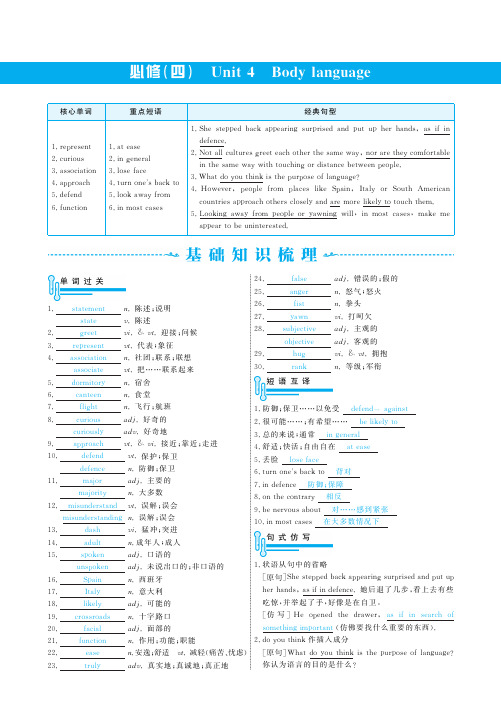
a d j.主要的 n.大多数
背对
防御 ; 保障 相反 对 感到紧张
9 9
9. b en e r v o u sa b o u t
1 7. 1 8.
1 6.
u n s o k e n p S a i n p I t a l y
s o k e n p
突进 v i .猛冲 ; 成年人 ; 成人 n.
4. a r o a c h p p 5. d e f e n d 6. f u n c t i o n
3. a s s o c i a t i o n
o r e l i k e l ot o u c ht h e m. c o u n t r i e sa r o a c ho t h e r sc l o s e l n da r em yt p p ya , , 5. L o o k i n w a r o mp e o l eo ry a w n i n i l li nm o s tc a s e s m a k em e ga yf p gw
单 词 过 关
1. 2. 4. s t a t e m e n t r e e t g s t a t e 说明 n.陈述 ; v.陈述
2 5.
2 4.
3.
a s s o c i a t i o n d o r m i t o r y c a n t e e n c u r i o u s f l i h t g a s s o c i a t e
r e r e s e n t p
问候 v i .& v t .迎接 ; 象征 v t .代表 ; 联系 ; 联想 n.社团 ; 把 联系起来 v t .
2 7.
2 6.
高中英语 Unit 4 Body Language Period 4导学案 新人教版必修4
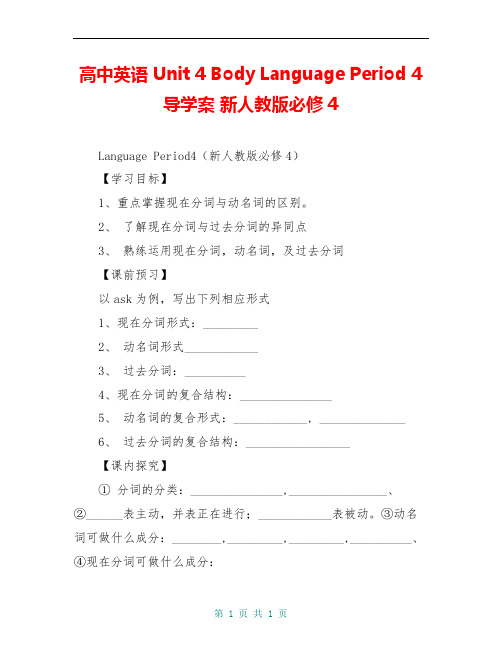
高中英语 Unit 4 Body Language Period 4导学案新人教版必修4Language Period4(新人教版必修4)【学习目标】1、重点掌握现在分词与动名词的区别。
2、了解现在分词与过去分词的异同点3、熟练运用现在分词,动名词,及过去分词【课前预习】以ask为例,写出下列相应形式1、现在分词形式:_________2、动名词形式____________3、过去分词:__________4、现在分词的复合结构:_______________5、动名词的复合形式:____________, ______________6、过去分词的复合结构:_________________【课内探究】① 分词的分类:_______________,________________、②______表主动,并表正在进行;____________表被动。
③动名词可做什么成分:________,_________,_________,__________、④现在分词可做什么成分:__________,_________,_________,_________⑤现在分词与动名词做定语的区别:________________________________________________⑥现在分词与动名词做表语的区别:________________________________________________⑦现在分词做状语,和句子的主语呈___________关系,做宾补时,和句子的宾语呈_______关系。
⑧过去分词做状语,和句子的主语呈___________关系,做宾补时,和句子的宾语呈_______关系。
【巩固练习】★单项选择1、_____dogs seldom bite、A、 BarkB、 To barkC、 BarkedD、 Barking2、To get there in time, they came _____all the way、A、 runningB、 runC、 ranD、 to run3、 He sat there _____, with his head on his hand、A、 and thinkB、 thinkingC、 thoughtD、 being thought4、The wolf spoke in a _____voice and Mr Dongguo felt_____、A、 frightened frighteningB、 frightened frightenedC、 frighten frighteningD、 frightening frightening5、 They set out _____for the _____、A 、searching losingB、 searching lostC、 to search lostD、 searched losing6、It’s a pleasure to watch the face of a_____baby、A、 asleepB、 sleepC、 sleepingD、 slept7、The boy sat there _____what to do、A、doesn’t knowingB、didn’t knowingC、 not knowD、 not knowing8、The secretary worked late into the night, _____a long speech for the international conference、A、 to prepareB、 preparedC、 preparingD、 was preparing9、European football is played in80 countries _____it the most popular sport in the world、A、 makingB、 makesC、 madeD、 to make10、The _____Prime Minister expressed hissatisfaction with his talks, _____that he had enjoyed his stay hereA、 visiting addB、 visited addingC、 visiting addingD、visited added ★ 用所给词的正确形式填空1、The young man seems to be _____in law、 (interest)2、I’m sorry I don’t know、 You may ask the teacher __at the table、 (sit)3、The doctor told the patient to drink more______water、 (boil)4、I was writing a composition when I felt my head______(touch)5、We asked Grandpa ______down for a rest、 (sit)6、Did you feel your heart ______fast then? (beat)7、It’s nothing to get ______about、 (excite)8、The student has got used to ______English both in class and out of class、 (speak)9、I’ll try my best _____English pretty well、(study)10、Do you know the man _____a book over there? (read)11、I think it difficult ______everything well、 (do)12、Granny Li was _______to find her room clean and tidy、 (surprise)13、Have you finished ______the letter? (write)14、He has another letter ______this afternoon、(write)15、I saw him _____under the big tree、 (dance)16、_____ by the party, we have won one victory after another、 (lead)17、the path _____to the top of the mountain was covered with snow、 (lead)18、Bob is strong enough _____ the heavy box、 (carry)19、They decided ____off the meeting till next Sunday、 (put)20、One is never too old ____、 (learn)21、It’s hard to go up a hill _____a big bag ofrice、 (carry)22、Jack suggested ____off the meeting tilltomorrow、 (put)23、It’s no use ____by rote、 (learn)24、Rose enjoys ____folk songs、 (sing)25、______is a chemical change、 (burn)26、My job is _____English、 (teach)27、The girl was heard _____in the next room、 (sing)28、Scientists have found out a better method _____up an atom、 (break)29、I’ve never heard the song _____so beautifully、(sing)30、Not ____her telephone number, I wrote a letter to her、 (know)31、Don’t worry, I’ll have him _____the radio for you, (repair)32、The hospital ____up last year is a big modern hospital、 (put)33、She spent a whole morning _____over the Chinese lessons、 (go)34、My transistor is out of order、I’ll have it_____、 (repair)35、The color film is well worth _____、 (see)36、It took her four hours ______over her lessons、(go)37、The People Hotel _____ up now will be the largest in the city、 (put)38、Before liberation the poor had no houses_____in、 (live)39、They are discussing where _____up the children’s palace、 (put)40、Having _____here for a long time, he know everyone very well、 (live)41、_____his beloved leader, the wounded soldier smiled、 (see)42、The students stopped _____when the bell rang、(talk)43、Some stars are too far away for us ____、 (see)44、Last autumn we helped the farmers _____ in the crops、 (get)45、I hate _____at、 (laugh)46、When the young man came in, the league secretary stopped _____to him, (talk)47、The peasants are busy _____in the crops、 (get)48、We couldn’t help _____at the funny story、(laugh)49、China was the first country ____use of silk, (make)50、Would you mind my ____the window? (close)51、You should avoid ____the same mistake again、(make)52、The door is ______、 (close)53、They found it necessary _____the experiment once more、 (make)54、He is determined to try _____a new type machine、(make)55、The boy stood there, _____a face at us、 (make)56、_____of stone, the bridge is much more substantial than those made of wood、 (make)57、The house needs _____、 (clean)58、John tried _____himself understood but failed, (make)59、_____the meeting room, he went home、 (clean)60、He had to delay _____to school because of the heavy rain、 (go)【总结】_____________________________________________________ _________________________________________________________ _________________________________________________________ _________________________________________________________ _________________________________________________________ _________________________________________________________ _________【单元检测】★单项选择1、The children _______ everything they saw at the exhibition and showed great interest in those things they had never seen before、A、 were curious aboutB、 were particular aboutC、 were curious forD、 were careful about1、Marxism---Leninism was introduced _______ China______ the beginning of last century、A、 into; atB、 into; inC、 to; atD、 to; in3、 Please read the article quickly and get a________idea of it、A、 mainB、 generalC、 sameD、 whole、4、 The young man was seen _____ into the sitting—room、A、 stealB、 be stealingC、 had stolenD、 stealing5、 There went the bell ______ the end of the play、A、 announcingB、 informingC、 declaringD、 telling二、请根据各句上下文的意义,选择正确的单词填入空白处。
2021人教版高中英语必修四Unit 4《Body language》word导学案2
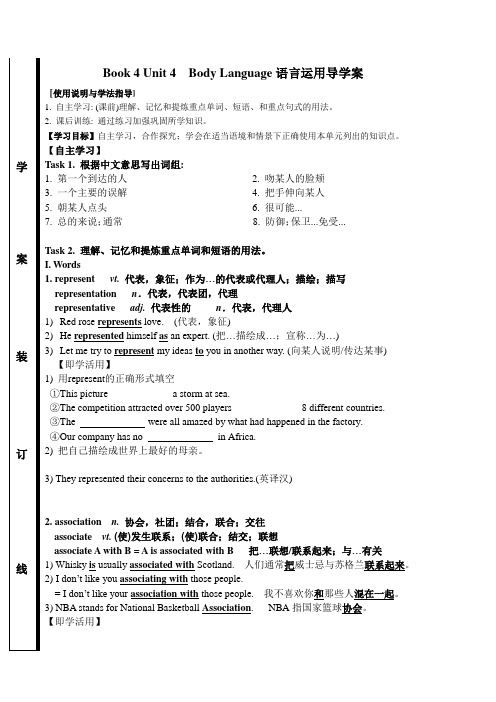
Book 4 Unit 4 Body Language 语言运用导学案[使用说明与学法指导]1. 自主学习: (课前)理解、记忆和提炼重点单词、短语、和重点句式的用法。
2. 课后训练: 通过练习加强巩固所学知识。
【学习目标】自主学习,合作探究;学会在适当语境和情景下正确使用本单元列出的知识点。
【自主学习】 Task 1. 根据中文意思写出词组: 1. 第一个到达的人______________ 2. 吻某人的脸颊______________ 3. 一个主要的误解______________ 4. 把手伸向某人______________ 5. 朝某人点头______________ 6. 很可能...______________ 7. 总的来说;通常______________ 8. 防御;保卫...免受...______________ Task 2. 理解、记忆和提炼重点单词和短语的用法。
I. Words 1. represent vt. 代表,象征;作为…的代表或代理人;描绘;描写 representation n .代表,代表团,代理 representative adj. 代表性的 n .代表,代理人 1) Red rose represents love. (代表,象征) 2) He represented himself as an expert. (把…描绘成…;宣称…为…) 3) Let me try to represent my ideas to you in another way. (向某人说明/传达某事) 【即学活用】 1) 用represent 的正确形式填空 ①This picture ____________ a storm at sea. ②The competition attracted over 500 players _____________ 8 different countries. ③The ______ were all amazed by what had happened in the factory. ④Our company has no _____ in Africa. 2) 把自己描绘成世界上最好的母亲。
人教新课标高中英语必修四Unit4Bodylanguage导学案(1)
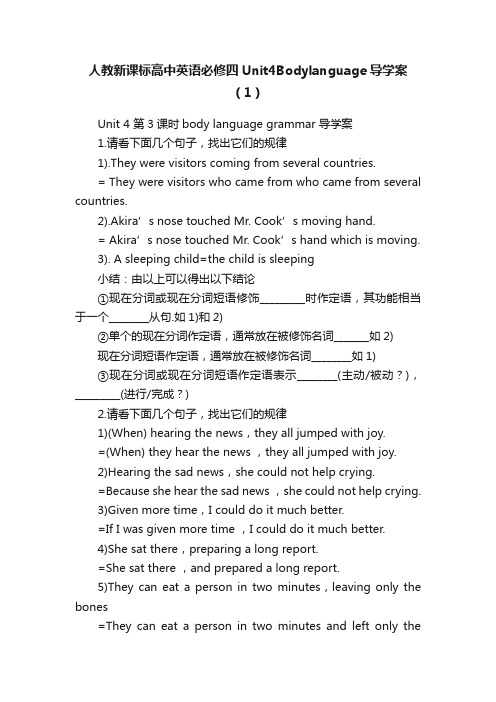
人教新课标高中英语必修四Unit4Bodylanguage导学案(1)Unit 4 第3课时body language grammar 导学案1.请看下面几个句子,找出它们的规律1).They were visitors coming from several countries.= They were visitors who came from who came from several countries.2).Akira’s nose touched Mr. Cook’s moving hand.= Akira’s nose touched Mr. Cook’s hand which is moving.3). A sleeping child=the child is sleeping小结:由以上可以得出以下结论①现在分词或现在分词短语修饰_________时作定语,其功能相当于一个________从句.如1)和2)②单个的现在分词作定语,通常放在被修饰名词_______如2)现在分词短语作定语,通常放在被修饰名词________如1)③现在分词或现在分词短语作定语表示________(主动/被动?),_________(进行/完成?)2.请看下面几个句子,找出它们的规律1)(When) hearing the news,they all jumped with joy.=(When) they hear the news ,they all jumped with joy.2)Hearing the sad news,she could not help crying.=Because she hear the sad news ,she could not help crying.3)Given more time,I could do it much better.=If I was given more time ,I could do it much better.4)She sat there,preparing a long report.=She sat there ,and prepared a long report.5)They can eat a person in two minutes,leaving only the bones=They can eat a person in two minutes and left only thebones .6)Not being a clever student,he works hard.7)Having finished her work,she went home.=After she finished her work,she went home小结:由以上可以得出以下结论①现在分词做状语可以表示_______,________,_______,_______,__________等相当于对应的时间,原因,条件,伴随,结果等状语从句。
人教新课标高中英语必修四Unit 4 Body language导学案(4)

Unit 4 导学案1学习目标: 1.学习掌握reading1中所涉及的重点单词,短语和句型。
2.自主合作探究,通过练习,进一步巩固所学知识点在具体语言环境中的作用。
学法指导:1.运用双色笔,蓝色标注基本知识,红色标注难点、易错点。
2.重点词汇和句型来源于课文,请同学们从课文中找出并勾画出来,课后背诵。
3.探究案和训练案中的词汇句型的预习方法应遵循研读例句------归纳总结---练习巩固的步骤。
第一部分:预习案Ⅰ.重要单词聚焦1._____________vi&vt. 迎接,问候2._____________n. 陈述,说明3._____________vt. 代表,象征4._____________n. 飞行,航班5._____________ n. 面颊6._____________ adv. 好奇地7._____________n. 接近;方法;途径vi&vt.接近;靠近;走进8.______________n. 误解;误会9._____________ adj. 主要的10._____________vt. 保护;保卫11.______________adj. 口语的12._____________adj. 可能的;13.___________n.意大利14.__________vt. 猛冲;突进15.____________n. 防御16._____________vt. 误解;误会17._____________adj. 未说出口的;非口语的18.___________adj. 成人的;成熟的n. 成人;成年人19._____________n.十字路口Ⅱ.重点短语完型1.wait _____ 等待2.look ________环顾四周,四周张望3.kiss sb.___the cheek 亲某人的脸4.step_____ 后退,退后5.put____举起;张贴;挂起;搭起6._____if 似乎;好像7.together _____ 和……一起,连同8.____that moment 在那时,就在那时9.____ the contrary正相反10.learn ______ 了解;学习11._____ hands握手12._____ the same way同样地;以同样的方式13.communicate _____交流;沟通;通话14.as _____ as 一……就…… 15.be likely_____ 很可能……;有希望……16.as ______ 和,也,还,17._____ general总的来说;通常Ш.经典句型运用1._______________________ (第一个到达的人) was Tony Garcia from Colombia,closely followed by Julia Smith from Britain. 第一个到达的是从哥伦比亚来的托尼·加西亚,随后紧跟着的是英国的朱莉娅·史密斯。
高中英语导学案 Unit 4 Body language 新人教版必修4
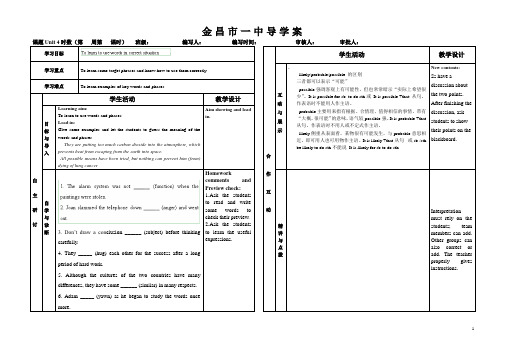
金昌市一中导学案课题Unit 4时数(第周第课时)班级:编写人:编写时间:审核人:审批人:学习目标合作互动学生活动教学设计学习重点To learn some target phrases and know how to use them correctly互动与展示.likely/probable/possible 的区别三者都可以表示“可能”possible强调客观上有可能性,但也常常暗示“实际上希望很少”。
It is possible for sb. to do sth.或It is possible +that 从句。
作表语时不能用人作主语。
probable主要用来指有根据、合情理、值得相信的事情,带有“大概,很可能”的意味,语气较possible强。
It is probable +that从句。
作表语时不用人或不定式作主语。
likely侧重从表面看,某物很有可能发生,与probable意思相近。
即可用人也可用物作主语。
It is likely +that从句. 或sb./sthbe likely to do sth.不能说It is likely for sb to do sth.New contents:Ss have adiscussion aboutthe two points.After finishing thediscussion, askstudents to showtheir points on theblackboard.学习难点To learn examples of key words and phases自主研讨学生活动教学设计目标与导入Learning aim:To learn to use words and phasesLead in:Give some examples and let the students to guess the meaning of thewords and phasesThey are putting too much carbon dioxide into the atmosphere, whichprevents heat from escaping from the earth into space.All possible means have been tried, but nothing can prevent him (from)dying of lung cancerAim showing and leadin.自学与诊断 3. Don’t draw a con clusion ______ (subject) before thinkingcarefully.4. They _____ (hug) each other for the success after a longperiod of hard work.5. Although the cultures of the two countries have manydifferences, they have some ______ (similar) in many respects.6. Adam _____ (yawn) as he began to study the words oncemore.Homeworkcomments andPreview check:1.Ask the studentsto read and writesome words tocheck their preview.2.Ask the studentsto learn the usefulexpressions.精讲与点拨Interpretationmust rely on thestudents; teammembers can add.Other groups canalso correct oradd. The teacherproperly givesinstructions.检测与评价学生活动教学设计达标检测题检测与纠错1. My father’s f_____ expressio n suggested that he was veryhappy.2. The teacher did not explain its grammatical _____ (功能).3. The doctor will give you something to _____ (减轻) the pain.4. When she was stopped by the police for speeding, she gavethem a f_____ name and address.5. This is a very _____ (主观的) judgment of her abilities.Test andconsolidation:Ask the students todo the test and thenthe group markthem and give thescores they shouldget.Fill in the blanksapproach, go, do, satisfy, walk, study, read, chat, dine, fixAs far as I know, no matter how good a student is at every subject, he will be nervousabout the 1. ______ exam. Everybody wants a(n) 2. ______ result after a long term of 3.______ at school. So when the final exam comes near, you will find nobody 4. ______carelessly in the schoolyard 5. ______ with each other or 6. ______ nothing. Everybody getsup early 7. ______ over their lessons and nobody sleeps late in the morning. In the 8. ______room, everybody sits at the desk 9. ______ their attention on their books and in the 10.______ hall, everybody eats their food quickly.Such is part of a student’s life in school.高考链接Ask the students tosummarize the skillswhile doing theexercises.课后反思:。
人教新课标高中英语必修四Unit 4 Body language导学案
Unit4 Body language第一篇课文学案课题: Unit4 Body language学习目标: Learn the text on Page 26 (学习课本26页课文)学习重点: The understanding and the language points in the text.(课文内容的理解及其课文中相关知识点的掌握)课前准备:阅读课文内容并完成下面Step2中关于课文理解的习题。
Teaching steps:Step1 Have a check about the last lesson.(检查上节课内容)Step2 Reading 阅读课本26页课文,并完成下面问题1.What is the purpose of learning language?__________________________________________________________________2.Choose the right answer:(1.) What is the main idea of the text?A. There are different customs in different countries.B. Foreigners should follow the customs of the country where they are visiting.C. People use body movements to send messages and different body movements have differentmeanings.D. The importance of knowing customs.(2.) If two men stand close to each other while talking, they cannot be from _____.A. an Arab countryB. USAC. BritainD. Russia3. 连线题(根据课文内容,把左边的人物和右边的字母正确连线)(1)Mr Garcia A. shake hands and kisses other twice on each cheek.( Columbia )(2)Julia Smith B. bows.(Britain )(3)Akira Nagata C. shake hands.( Japan)(4)George Cook D approaches others closely and touches their shoulder( Canada ) and kisses them on the cheek(5)Madame Coulon E. does not stand close to others or touch strangers( France )4.Ways to greet each other(连线)(1).Approach others closely and are more likely to touch them. A.Japan(2).Bow. B.Jordan(3).Shake hands. C.Columbia(4).Shake hands and stand quite close to other men. D.CanadaNod to women but do not shake hands with them.1.Read the text carefully, then decide if the following statements are true (T) or false (F).(1 ).English men often stand close to others or touch strangers as soon as they meet.(2.)Most people around the world now greet each other by kissing . ( )(3).Japanese will bow to others as greeting. ( )(4).People from Jordan will move very close to you as you introduce yourself to them( )(5).Some body languages in some countries are good while some countries’body language are bad. ( )2.Find out the two mistakes the writer found in the airport:☆Mr. Garcia from__________ He approaches Ms Smith by _______ ______ ________ and _______ her on the ________.☆Julia Smith from_______ She ______ ________ appearing _________ and take a few steps _______ ______ Mr. Garcia.☆ A Japanese________ to Mr. Cook and his nose _________ Mr. Cook’s _______ ________.☆George Cook from________ He ________ ________ _______ ________ to the Japanese.Step3 : Learning the language points1. student canteen 学生餐厅2. (1)I saw several young people enter the waiting areas, looking around curiously.我看见几个年轻人走进了等候区,好奇地向四周张望。
PEP新课标英语必修四Unit 4 Body language词汇部分优质课导学案附答案
Unit 4 Body language预习导引熟读本单元生词及短语探究与交流1.r epresent vt.代表,象征;作为……的代表或代理人representation n.代表,代表团,代理represent…as…把…描绘成…represent sb. as/to be 宣称某人为……represent sth. to sb. 向某人说明某事;向某人传达某事(1)represent用来表示“代表某人/某个团体/政府等”“某种标志代表什么”“某物(书、雕塑等)表现的是什么”和“把某人/物描绘成什么”。
(2)on behalf of只能用做状语,表示“代表/代替某人”。
(3)stand for往往用来表示“(字母、数字、符号等)代表/象征什么”。
[即学即练1](1) The rose _____________ love.玫瑰花是爱情的象征。
(2) This picture _____________ a storm at sea.这幅画表现的是海上风暴。
(3) He ____________ China in the conference.他代表中国参加了这次会议。
(4) He ___________ himself ________ an expert.他称自己是专家。
2. curious adj.好奇的,爱探究的,奇怪的, curiously adv. 好奇地,curiosity .n 好奇心be curious about 对……感到好奇be curious to do sth. 渴望做……out of curiosity 出于好奇meet/satisfy one‘s curiosity 满足某人的好奇心in/ with curiosity=curiously 好奇地* He grew curious about how to make a toy.* Ryle accepted more out of curiosity than anything else.* S he was consumed with curiosity. 她心里充满了好奇心。
人教版高中英语必修4《Unit4Bodylanguage》教案
人教版高中英语必修4《Unit4Bodylanguage》教案人教版高中英语必修4《Unit 4 Body language》教案【一】教学准备教学目标1. 教学目标(1)知识目标:学生能掌握下列重点单词和短语的意义和用法:greet, represent, approach, expression, defend, misunderstand, adult, cheek, major, likely, in general。
能够表达一些Body language.(2)能力目标:学生能掌握基本的阅读理解方法:速读,寻读,归纳中心和查找细节。
(3)情感目标:学生了解不同国家和文化的身势语,激发学生学习这种语言的兴趣。
教学重难点教学重点和难点(1) 培养学生的阅读策略和技巧,让学生了解文章的细节知识和文章结构。
(2) 让学生合适地使用不同的身势语。
(3)课文中现在分词作定语和状语的长难句。
教学过程Step 1. Lead in(1)The teacher shows a question on screen:How can we communicate with others when we can’t speak ?Then ask a student to answer.设计说明:引出本单元的话题。
(2) The teacher shows some pictures on screen of some body language and ask some students to guess and discuss the meaning they stand for. 设计说明:引出本节课的题目。
Step 2. Fast reading1. Go through the passage quickly and find out the main idea of each paragraph.o Match the main idea of each para. with lines.(Para.1) A. Other examples of different greeting body language.(Para.2) B. Different people have different body language.(Para.3) C. Summary of body language.(Para.4) D. Meet the visitors at the airport.(Para.5) E. Examples of different greeting body language.2. Try to write down the main idea of the text.The text is mainly about different _____________ in different countries. In order to avoid difficulties in today’s world of cultural crossroads, we should ___________________________.设计说明:通过这个题目的练习,让学生掌握速读,先对文章段落大意有一个了解。
高中英语选择性必修一《UNIT 4 Body Language》导学案
高中英语选择性必修一《UNIT 4Body Language》导学案【话题导入】Why Body Language Is Important?When you learn a foreign language, you must learn more than the vocabulary and the grammar.To communicate successfully, you must also learn the non-verbal language, or “body language” of that culture.“Body language” is a term used to describe facial expressions, gestures, and other movements of the body that send messages.This means of communication is so important that we may actually say more with our movements than with words.For some messages, words are not enough.Speaking a foreign language is sometimes difficult because we may not understand the non-verbal signals of another culture.For example, nodding the head up and down is a gesture that may communicate different messages in different parts of the world.In North America, it means “I agree”.In the Middle East, nodding the head down means “I agree” and up means “I disagree”.In a conversation among Japanese it often simply means “I'm listening”.Eye contact is also very meaningful, but it can also mean different things in different countries.In some Spanish-speaking countries, children show respect to an old person by not looking directly into the person's eye during a conversation.In other cultures, looking into a person's eye is expected.For example, if you don't do it in the United States, people may think that you are afraid, embarrassed, or angry.In the Middle East, direct eye contact in a conversation is more continuous than in many other parts of the world.People who are not used to this may feel uncomfortable.开启快乐学习之旅当你学习一门外语的时候,你必须学习词汇和语法以外的东西。
- 1、下载文档前请自行甄别文档内容的完整性,平台不提供额外的编辑、内容补充、找答案等附加服务。
- 2、"仅部分预览"的文档,不可在线预览部分如存在完整性等问题,可反馈申请退款(可完整预览的文档不适用该条件!)。
- 3、如文档侵犯您的权益,请联系客服反馈,我们会尽快为您处理(人工客服工作时间:9:00-18:30)。
Unit 4 Using Language词汇导学案编号4Unit 4 Book 4 Body LanguageThere is always a way out. 天无绝人之路Section Four : Key expressions in in Using LanguageTeac hing Aims:To learn some useful words and expressions in this part.Step1. Lead-in在文中划出这些短语并翻译成中文。
1.lose one’s face _____________2.as well as _______________3.even if ____________4.means of communication_________________5.be based on ________________6. in most cases ____________7.make a fist ____________8.give a hug to sb / hug sb __________________9. turn one’s back to ________________10. at ease ________________11 an amazing thing ______________12.be wrong about each other ___________________13. be respectful to _____________14. intend for sb to do sth _______________15. have some similarities in ___________________Step2. Learning &ThinkingIt is possible to “read” others around us, even if they do not intend for us to catch their unspoke n c ommunication.我们可以了解别人, 即使有时他们并不想要我们了解他们没说出来的语言。
even if/though 是连词词组, 用来引导让步状语从句,意为“尽管; 即使”。
注意: 若主句与从句皆表示将来情况, even if 从句可用一般现在时代替将来时。
(1).Even if I __________( leave) now, it’ll be too late.(2).We have decided to visit the Museum even though it____________ (rain) tomorrow.2. The most universal facial expression is, of course, the smil e — its function is to show happiness and put people at ease.1). function n.[C]作用;功能;职能vi.起作用;运转(1) function as ; ___________(2) function properly. ___________(3) The function of a chairman;______________________(4) The function of a cash-machine ______________________2). ease n.[U]安逸;舒适vt.减轻(痛苦、忧虑)(1)feel at ease ___________________(2) with ease; = easily; ________(3) live a life of ease; ________________________(4) ease your pain; ________________________(5). The new manager has a good sense of humor, which puts people who work with him_____.A. in troubleB. at presentC. in debtD. at ease介词填空:1.Her mind was _____ ease knowing that the children were safe.2.He passed the examination ______ ease.3. There are unhappy smiles, such as when someone“lose face” and smiles to hide it.(1)lose face ___________(2) save face _________(3) face to face _________(4) in face of; __________(5) ma ke faces ___________(6) to sb’s face ___________【相关拓展】:(1) lose heart; ____________(2) lose weight __________(3) lose courage; _________(4) lose one's temper ________(5) lose one’s head _________(6) lose one’s way _________(7) lose one's life __________(8) lose one's heart to_________(9) lose sight of _________(10) be lost in thought________4. In most places around the world, frowning and turningone’s back to someone shows anger.(1) turn one's back to him; __________(2) put one's back into ___________(3) back to back ___________(4) on one’s back____________5.Looking away from people or yawning will, in most cases, make me appear to be uninterested. 如果把眼光从某人身上移开, 或者打了个哈欠, 这就会让人知道我不感兴趣。
(1) look away from__________________(2) look at _____________(3) look back _____________(4) look down on/upon ________(5)look for _____________(6) look forward to __________(7)look into ____________(8) look out ___________(9) look on ____________(10) look over ___________(11)look through___________(12)look up ___________6. Not all cultures greet each other the same way, nor are they comfortable in the same way with touching or distance between people.【句式点拨】这个句子是由一个中心短语not…nor…连接起来的,意为“既不…也不…”。
后半句采用了部分倒装形式。
(1)“nor/neither+be动词/助动词/情态动词+主语”,表示“也不”。
当前面的句子用否定,后面的句子表示“也不”时,运用此句型。
—I haven't finished my homework yet.—Really? If so, nor have I.(2)表达“也是如此”还有以下几种常见句型:①“so+助动词+主语”构成的倒装结构,用于肯定句中。
②So it is with+sb./sth.或It is the same with+sb./sth.前面的句子的谓语动词有多个,并且不同类,或有的用肯定有的用否定时。
1.Tom likes sports and games. _____________________ __(Jack也是如此).2.If you don’t go to Cathy’s birthday party this weekend________________________________________ (我也不去).3.Tom studies hard and is never late for school. _________________ ____________________(迪克也是如此).4.—Tom doesn't like watching TV but he enjoys playing football.—____________________________ . (我哥哥也一样).5. I have not been asked to leave my job, _____ to do so.A. so do I intendB. so I intendC. nor do I intendD. nor I intendStep3,Testing:Fill in the blanks with proper words or phrases fromthe text on Page 30.Body language is one of the most powerful means of communication. Though people don’t intend for us to understand their (1) ___ communication, we still can read their emotions through their gestures and actions.The smile is one of the most widely used(2) ___ expressions in the world. Its(3) ___ is to show our happiness and put people(4) ___. However, the smile does not always mean that we are (5)___ happy. Smiles can be (6)___ sometimes, hiding other feelingslike (7)___, fear and worry. In many places around the world, we show our anger by frowning and turning our(8) ___ t o some one. We make a(9) ___ and shake it to show that we are angry. Nodding our head is considered a means to show our agreement almost all over the world. It is not a good idea to give a (10)___ to our boss or teachers.It is not good to stand too close to a person of a higher rank.Money lost, little lost; time lost ,everything lost.失去金钱损失小,失去时间全完了。
